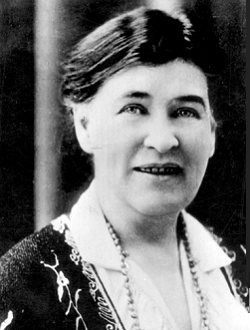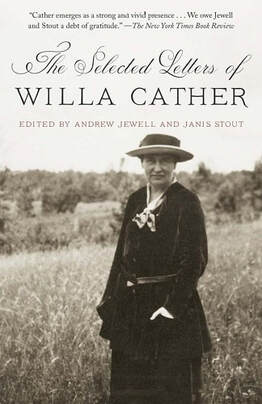September 2023 Celebrated Artist
THE TWO WILLA CATHERS:
Celebrating a Revered Novelist 150 Years After her Birth
A peek at Willa Cather’s life and writings as part of our issue focusing on “Arts in Education.”
Willa Cather (1873-1947)
Image: Encyclopedia Britannica
Image: Encyclopedia Britannica
By Sandra Bertrand
The struggle to be great at anything is a particularly human trait. To achieve greatness is a wholly different matter. On the 150th anniversary of Willa Cather’s birth, it’s the perfect time to take a close look at one of this country’s greatest novelists and how she was able to reconcile the act of writing between the masculine and feminine sides of herself – without tearing herself apart.
Born in Virginia in 1873, she emigrated with her family ten years later to Red Cloud, Nebraska, named for the famous Oglala Lakota chief. In My Antonia, her fictionalized self regards the land for the first time:
Born in Virginia in 1873, she emigrated with her family ten years later to Red Cloud, Nebraska, named for the famous Oglala Lakota chief. In My Antonia, her fictionalized self regards the land for the first time:
|
“Cautiously, I slipped from under the Buffalo hide…if there was a road, I could not make it out in the faint starlight. There was nothing but land…I had the feeling that the world was left behind, that we had got over the edge of it and were outside man’s jurisdiction.”
|
In such an unforgiving landscape, why shouldn’t one forge a new identity for oneself, one unhinged from the Victorian mores of the day? Willa did exactly that, baptizing herself “William Cather, Jr.” in adolescence, linking herself to her mother’s brother who had fought on the Virginia side in the Civil War.
|
In 1890, Cather, a disciplined student and voracious reader, went to Lincoln to attend the University of Nebraska in hopes of becoming a doctor. But when an instructor submitted an essay she had written to the Nebraska State Journal, her fate as a writer was sealed. Pittsburgh beckoned with an offer to become a magazine editor, and it was there she settled for the next ten years, sharing a relationship with Isabelle McClung, one of the two most important women in Cather’s life. Her second union was with Edith Lewis, a Nebraska companion who shared an apartment when Cather moved to New York City to become the managing editor of McClure’s – a well-respected publication of its day. These were serious love affairs, but Cather, at the risk of obliterating a promising writing career, could not countenance public exposure.
She produced a dozen novels, many novellas, short stories, and poems, as well as countless magazine and newspaper articles. Throughout her career, Cather remained on public display as a distinguished and stylish conveyor of American letters. Bent on destroying many of her letters and earlier works, she was determined that her reputation would remain unsullied by a world unable to accept the other Cather. |
Did you know?
|
This constant struggle between femininity and creativity – the perception in the culture that the act of creation was a male provenance – would continue to haunt her. In Sharon O’Brien’s perceptive biography, Willa Cather, The Emerging Voice, Cather told author Sinclair Lewis that the critics cursed her for not writing like a man. But once she accepted herself as a woman writer, she was finally able to put flesh on her female characters.
And what characters! These were strong, often indomitable women, capable of tenderness and tenacity in the same breath. Perhaps one of the most significant voices that helped her in this ongoing push and pull toward a feminine identity was Sarah Orne Jewett, a woman writer who could capture the eyes and ears beyond her own self-identity in her native Maine. If it were possible for Jewett, then Cather, too, could find cadences of truth in her own Nebraska heroines.
The real breakthrough happened in 1913 with O Pioneers!, the first of three prairie stories to resonate with a wider audience. Alexandra Bergson is a young Swedish American girl, left to manage the homestead when her father dies.
And what characters! These were strong, often indomitable women, capable of tenderness and tenacity in the same breath. Perhaps one of the most significant voices that helped her in this ongoing push and pull toward a feminine identity was Sarah Orne Jewett, a woman writer who could capture the eyes and ears beyond her own self-identity in her native Maine. If it were possible for Jewett, then Cather, too, could find cadences of truth in her own Nebraska heroines.
The real breakthrough happened in 1913 with O Pioneers!, the first of three prairie stories to resonate with a wider audience. Alexandra Bergson is a young Swedish American girl, left to manage the homestead when her father dies.
|
“She had never known before how much the country meant to her. The chirping of the insects down in the long grass had been like the sweetest music. She had felt as if her heart were hiding down there, somewhere, with the quail and the plover and all the little wild things that crooned or buzzed in the sun. Under the long shaggy ridges, she felt the future stirring.”
|
This is a future that Alexandra will rush toward with open arms, whatever the cost. The land has spoken.
In The Song of the Lark, the talented Thea Kronborg will find her destiny as a Metropolitan opera star. From Colorado to Chicago to the Southwest, she finds her passion in music and in the land. Crossing the Platte River by rail, she saw it was over “flat lands like this, stretching out to drink the sun, that the larks sang – and one’s heart sang there, too.” She’s glad it’s her country, “even if one did not learn to speak elegantly there.”
The most widely read of these sagas is My Antonia. Arriving on the Nebraska frontier as a Bohemian emigrant, the girl suffers a father’s suicide and desertion by the father of her child. But her unwavering spirit will not break. She draws sustenance from her orchard, explaining how there wasn’t a single tree when she first came, “I love them as if they were people,” she confesses. In the words of her boyhood friend:
In The Song of the Lark, the talented Thea Kronborg will find her destiny as a Metropolitan opera star. From Colorado to Chicago to the Southwest, she finds her passion in music and in the land. Crossing the Platte River by rail, she saw it was over “flat lands like this, stretching out to drink the sun, that the larks sang – and one’s heart sang there, too.” She’s glad it’s her country, “even if one did not learn to speak elegantly there.”
The most widely read of these sagas is My Antonia. Arriving on the Nebraska frontier as a Bohemian emigrant, the girl suffers a father’s suicide and desertion by the father of her child. But her unwavering spirit will not break. She draws sustenance from her orchard, explaining how there wasn’t a single tree when she first came, “I love them as if they were people,” she confesses. In the words of her boyhood friend:
|
“She was a battered woman now, not a lovely girl, but she had something which fires the imagination…She had only to stand in the orchard, to put her hand on a little crab tree and look up at the apples, to make you feel the goodness of planting and tending and harvesting at last. All the strong things of her heart came out in her body that had been so tireless in serving generous emotions.”
|
Many of Cather’s novels feature a fictionalized Red Cloud – whether Hanover, Black Hawk or Sweetwater, the land is the same, and she knew it like the back of her hand. Today the town boasts about a thousand souls, and it’s a good bet that they all recognize Cather as their most famous citizen. There are brick storefronts that house the Willa Cather Foundation and the National Willa Cather Center. The family home can be rented as a guest house and the Memorial Prairie can be hiked, all 612 acres of its native shortgrass.
The lasting takeaway for this writer, perhaps the best writer of place the country has produced, is the truthfulness and sense of wholeness that emerges in the characters Cather produced. If Cather herself was often divided about her identity as a woman writer, she has redeemed herself over and over again in the fictional lives she has given us. Alexandra, Thea, Antonia and so many others remain alive.
The lasting takeaway for this writer, perhaps the best writer of place the country has produced, is the truthfulness and sense of wholeness that emerges in the characters Cather produced. If Cather herself was often divided about her identity as a woman writer, she has redeemed herself over and over again in the fictional lives she has given us. Alexandra, Thea, Antonia and so many others remain alive.







